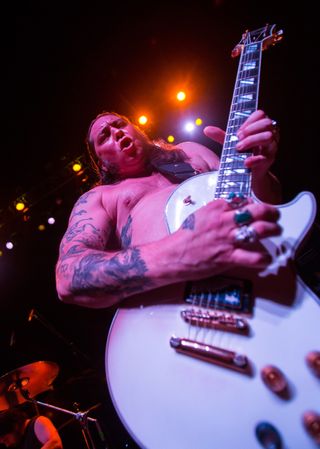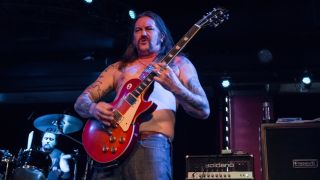One of heavy metal’s strengths is its musicians’ ability restart careers. Being in one popular, influential and generally loved band that comes to an end can simply be the start of another stage of your life. In other strands of music, you might end up being forever asked to play your old band’s stuff, but in metal, your new band can get a life of its own. Just ask Matt Pike.
His former band Sleep helped invent stoner metal, and remain hugely important to doom as a whole – this despite the stoner/sludge/doom section of the underground being one of the most creatively vibrant areas in heavy music. And while Sleep still play here and there, headlining Desertfest earlier this year, he’s now been in High On Fire twice as long as the initial run of Sleep. Curiously, while it would be easy to point to (the admittedly brilliant) Blessed Black Wings as HoF’s career highlight, their music has arguably continued to improve as time has gone on, with new album Luminiferous up there with their very best, all crunch and snarl and impact.
“The [new songs] benefit from a 20-year education! Experience is kind of like going to college for being a journalist – but there’s nothing like life experience,” Matt tells Hammer. “I’ve been on the road for 26 years now, everybody with me has been on the road for quite a long time, and you just get better at it as you go. You get better at playing. You learn things from different people. It’s just experience. Experience, and having a passion for it, and a lot of willpower to persevere through the hard times – which is usually every day!”
While there are significant examples of bands that did their best work in an explosion of youthful creativity (Metallica, most obviously), there are an equal number of bands who get better with age. Matt’s explanation above may help explain why this is the case. And of course, there is no textbook that teaches you how to write good songs.
“I’ve always been a person that learned the hard way – with everything, not just music,” says Matt. “I’m kind of stubborn like that – especially if it has to do with art, where there’s not a right way to do anything. There’s ways that sound better to different people, but there is no right or wrong way. Art shouldn’t have rules, because the minute you do that, you’re turning art into fascism, and then you should go put duct tape over all the nude paintings’ nipples, and take all the good chapters of Hemmingway books. Art shouldn’t have rules like that. But you definitely develop a style, and in the words of Charles Bukowski, style’s everything. It’s not how technically good you are, it’s the style you have doing it. If your style’s fluent, and it’s technically good, then you’ve covered all the bases.”

High On Fire is clearly a very different beast to Sleep. While both are psychedelic and atmospheric, High On Fire is far faster, with a trip that’s more “Mountain Dew and adderall” (to use Matt’s phrase) than the one induced by Sleep’s much-vaunted love of weed. But that’s not to say there was nothing learned from one that could be taken into the other, however.
“Sleep was like music 101 for my career!” Matt recalls. “What me and Al [Cisneros, Sleep bassist and vocalist] had learned to play like together has gone over into all our bands, including Sleep. That music was the foundation for the way we were going to play the next 20 years of our lives. It was like going to college, it was four years of us really learning what we could do. And you develop your set of tools, then you get older, and you get better at using your set of tools. Sleep was the fundamentals.”
The flip side to the expertise granted by experience is that people change as they get older. Mentalities, tastes and priorities can shift, and the creative urge can either shift dramatically in focus (David Vincent’s shift from death metal visionary to a villain of four-on-the-floor industrial being perhaps the most spectacular example), or even die completely. What is it that has kept Matt Pike driven to keep playing rapid fire riffs and writing new High On Fire songs?
“Finding things that I’m interested in saying with my songs,” he says. “I think the world’s in a really fucked place, and I have a voice and should state what I have to [with my music] – because I’m not much of a public speaker, in fact I barely even speak live, hardly ever. I hope that people read my lyrics and get what I’m talking about. Plus the drive of making art itself. It’s about passion and what’s in our hearts. That’s just what we do. I don’t feel right if I don’t pick a guitar up every day, I just start feeling odd. It’s just what we were all born to do.”
Not everyone who can’t get through the day without playing guitar helps found an entire scene, however. When Sleep headlined Desertfest earlier this year, it was about as appropriate a booking as it is possible to make. Of the bands responsible for that movement’s existence, perhaps only Kyuss (and obviously Black Sabbath’s role in birthing doom) are as key as Sleep. Obviously various other names (Saint Vitus, Cathedral, Monster Magnet and so forth) were hugely important, but Sleep’s role specifically in that sound is crucial. Matt himself is humbled by the suggestion.
“All I can think of is gratitude, gratitude that I can be a part of that [Desertfest],” he says. “For some weird reason, the cosmos put me here to do something. It’s not the greatest thing Man’s ever done, but it’s an accomplishment for me that’s very personal and very heartfelt. I have a lot of gratitude for being able to do it for a lot of people – and myself.”
From Sleep to High On Fire, Matt Pike has written more killer riffs than most bands manage to write songs. He’s sung about drugs and HP Lovecraft and conspiracy theories. He’s worked with some of the greatest producers ever to sit behind a console, like In Utero producer Steve Albini and Converge’s guitarist/producer extraordinaire Kurt Ballou. He has toured the world and played with many of the best bands in the world, taking Mastodon out before they were big, and fitting in with bands very different in sound – the tour with Fear Factory in 2010, for instance. But there remains one crucial question to answer, one thing everyone wants to know: Why the fuck does a man who every doom band on the planet would happily give free merch always play without a shirt?
“It’s because it’s comfortable for me, and because it saves me a lot of laundry!” he laughs. “If I have a shirt on, it annoys the shit out of me – I can’t play with festival wristbands on either, I can’t fucking handle it, it just messes me up. I’ve always done [played shirtless], so why fuck up a good thing?”

